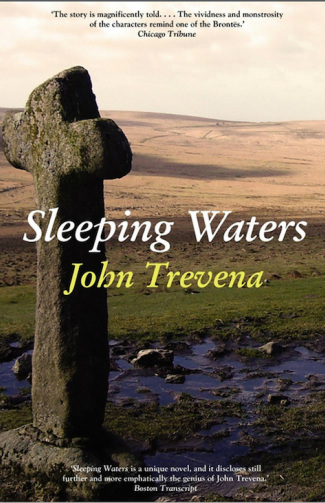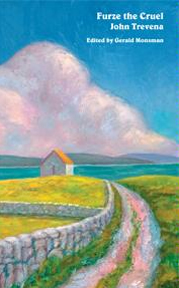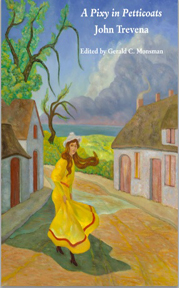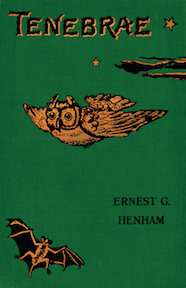|
BOOK DETAILS
Trade paper ISBN-13: 978-1939140005 List Price: $19.99 U.S. Pages: 404 Published: 2012 |
Sleeping Waters (1913)
John Trevena With a new introduction by Gerald Monsman Book Description
Father John Anger is worn down from a hard life as a Catholic priest ministering to the poor of London's slums. He travels to a remote village in Dartmoor seeking to recover his health by means of the salubrious air and medicinal waters, and he anticipates a long and tedious convalescence in the sleepy place. But Anger soon finds that despite the village's rustic appearance, it holds as much drama and tragedy as even London. Curgenven, a humpbacked dwarf and scheming attorney, has a diabolical plot to steal the ignorant villagers' land and resell it at a huge profit. Anger resolves to thwart the lawyer's plan, but he is not prepared for the dangerous secrets he will uncover, or the violent climax that his interference will provoke. . . . Ernest G. Henham (1870-1946) published melodramatic popular novels as a young man before moving to Dartmoor for his health and reinventing himself as "John Trevena." Trevena was regarded as one of the finest novelists of his time, but today he has fallen into total neglect, and his books are all but unobtainable. This 100th anniversary edition of Sleeping Waters (1913) includes a new introduction by Prof. Gerald Monsman, who argues for reconsideration of Trevena as an important Edwardian writer and regional novelist as significant as Thomas Hardy. |
reviews
"It would be difficult to find a novel more unusual or more original. That it is beautifully written, full of poetic passages, and contains many fascinating descriptions [...] will be regarded as a matter of course by those who have read any of [his] preceding books, and therefore know that John Trevena is unquestionably one of the most notable of living writers." - New York Times, Jan. 10, 1915
"The construction of the book is very artistic and is difficult to accomplish, but apart from its structural merits 'Sleeping Waters' has high value. [...] Our admiration for this author has been expressed over and over again. There is grasp and reach and power in [his] books [...] and they are books that place their author among the foremost of the English novelists." - Los Angeles Times, Feb. 21, 1915
"The story is magnificently told. . . . The vividness and monstrosity of the characters remind one of the Brontës." - Chicago Tribune, Jan. 13, 1915
"Sleeping Waters is a unique novel, and it discloses still further and more emphatically the genius of John Trevena." - Boston Transcript, Jan. 13, 1915
“[O]ne of England’s lost novelists, a writer of startling abilities . . . [S]trange and forceful . . . a story of ‘enchantment’ with a caustic edge’.” - Times Literary Supplement, April 12, 2013
"The construction of the book is very artistic and is difficult to accomplish, but apart from its structural merits 'Sleeping Waters' has high value. [...] Our admiration for this author has been expressed over and over again. There is grasp and reach and power in [his] books [...] and they are books that place their author among the foremost of the English novelists." - Los Angeles Times, Feb. 21, 1915
"The story is magnificently told. . . . The vividness and monstrosity of the characters remind one of the Brontës." - Chicago Tribune, Jan. 13, 1915
"Sleeping Waters is a unique novel, and it discloses still further and more emphatically the genius of John Trevena." - Boston Transcript, Jan. 13, 1915
“[O]ne of England’s lost novelists, a writer of startling abilities . . . [S]trange and forceful . . . a story of ‘enchantment’ with a caustic edge’.” - Times Literary Supplement, April 12, 2013
ALSO AVAILABLE THROUGH ONLINE RETAILERS
|
EBOOK
Kindle US |
MORE TITLES BY THIS AUTHOR
AUTHOR BIOGRAPHY
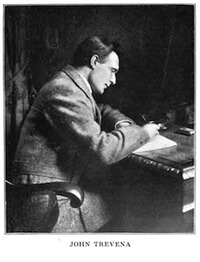
Ernest George Henham (“John Trevena”) was born in England in 1870, and as a young man travelled to America and Canada and lived for some time in the Canadian Northwest. His experiences in Canada, including his memories of the Riel Rebellion in the 1880s, provided the inspiration for some of his early works, which were published under his own name. As Ernest G. Henham, he published Menotah: A Tale of the Riel Rebellion (1897), which ran into at least three editions, God, Man & The Devil: A Novel (1897); the weird Gothic horror novel Tenebrae (1898); Bonanza: A Story of the Outside (1901); Scud: The Story of a Feud (1902); The Plowshare and the Sword: A Tale of Old Quebec (1903); ‘Krum’: A Study of Consciousness (1904); and The Feast of Bacchus: A Study in Dramatic Atmosphere (1907).
Suffering from ill health, he moved to Dartmoor around this time. In the words of a contemporary, “It is one of the strangest facts in literary history that a man, who had defined his place as a writer of fiction with nine novels or so, published under his own name, should have seen fit, after the Boer War, to begin his career afresh and write a long series of commercially unsuccessful novels under a pseudonym.” However, this was what Henham did, publishing A Pixy in Petticoats anonymously in 1906 before adopting the pseudonym John Trevena in 1907 for publication of Furze the Cruel. Furze was the first in a trilogy of novels focusing upon Dartmoor life, followed by Heather (1908) and Granite (1909). He continued to write prolifically, achieving widespread critical acclaim but little commercial success; his notable works include Bracken (1910), the story collection Written in the Rain (1910), Wintering Hay (1912), which the Los Angeles Times ranked with the works of Turgenev and Dostoevsky, Sleeping Waters (1913), and Moyle Church-Town (1915). Trevena’s life has become so shrouded in obscurity that as of the time of this printing even his date of death is not known, but he is believed to have died around 1946. Until Valancourt Books’ edition of Furze the Cruel in 2010, all his works were out of print, despite the near-universal critical consensus during his lifetime that his works would live on among the classics of English fiction.
Suffering from ill health, he moved to Dartmoor around this time. In the words of a contemporary, “It is one of the strangest facts in literary history that a man, who had defined his place as a writer of fiction with nine novels or so, published under his own name, should have seen fit, after the Boer War, to begin his career afresh and write a long series of commercially unsuccessful novels under a pseudonym.” However, this was what Henham did, publishing A Pixy in Petticoats anonymously in 1906 before adopting the pseudonym John Trevena in 1907 for publication of Furze the Cruel. Furze was the first in a trilogy of novels focusing upon Dartmoor life, followed by Heather (1908) and Granite (1909). He continued to write prolifically, achieving widespread critical acclaim but little commercial success; his notable works include Bracken (1910), the story collection Written in the Rain (1910), Wintering Hay (1912), which the Los Angeles Times ranked with the works of Turgenev and Dostoevsky, Sleeping Waters (1913), and Moyle Church-Town (1915). Trevena’s life has become so shrouded in obscurity that as of the time of this printing even his date of death is not known, but he is believed to have died around 1946. Until Valancourt Books’ edition of Furze the Cruel in 2010, all his works were out of print, despite the near-universal critical consensus during his lifetime that his works would live on among the classics of English fiction.

